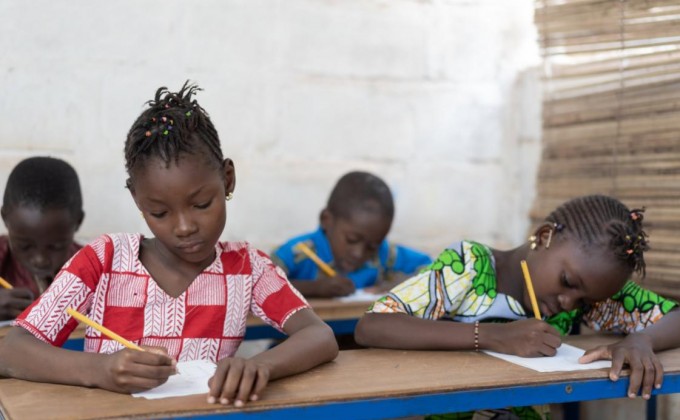
These school closures linked to the security crisis are further weakening the quality of the educational offering, especially in the most affected regions and in those areas hosting internally displaced people, where infrastructure and qualified teaching staff are sorely lacking. In these regions, security issues are amplifying the impact of socio-cultural tensions, especially for teenage girls who are more at risk of dropping out of school to get married or to find work in order to generate more income for the family. “Today in the country, there are more than 160,000 of them who are not going to elementary school … something had to be done, and Global Affairs Canada answered the call,” said project director on the field Clémence Sanou Ariste.
The Project in Support of Institutional and Technical Reforms for Equity in Education (PARITÉ) offers an integrated response to these issues and is taking up the challenge of giving girls and boys access to an inclusive, quality basic education. “We are providing institutional support to the Ministry of National Education, Literacy and the Promotion of National Languages (MENAPLN) in Burkina Faso in order to promote educational practices that support inclusion and learning, especially for girls, and to improve the management of education in a sustainable way,” explained Suzane Louchard, program director at Alinéa, leader of the project which is carried out in collaboration with the Centre for International Studies and Cooperation (CECI).
Improving the Educational Offering Through Institutional Support
As part of Canada Government’s strategy in support of Burkina Faso, the project provides its institutional partners at the central and regional levels with an experienced local technical team to support the plans and priorities of Burkina Faso’s government for inclusive education, especially its Program for the Strategic Development of Basic Education (PDSEB), in order to overcome the structural obstacles to the education of children, and girls in particular. “We are here to support the Burkinabè government in its efforts to democratize its educational offering. This will allow the country to advance the fourth Sustainable Development Goal of the United Nations for 2030, which is to ensure access to quality education for all. Our mandate is to support them in implementing activities to improve the quality of the educational offering as well as in managing the available resources in a sound and efficient way,” explained Ms. Louchard.
The project’s teams on the ground are also working closely to MENAPLN to support the stakeholders of the educational community, including the Parents and Students' Associations, the Mother Educators’ Association and the School Management Committees, in order to better monitor both students and teachers through the learning/teaching process, thus improving the access to, the retention rate and the quality of the educational offering. “This is particularly important in a context of insecurity where everyone has to get involved in making sure children can go to school,” added Ms. Sanou Ariste.
Focusing on Inclusion and Gender Equality
One of the components of the project is to provide technical support to the MENAPLN for the integration and monitoring of gender priorities in basic education. This will help reduce inequalities in the access to education, especially for girls.
“Once the girls are in school, it is necesary to make sure that the education they receive is of quality and meets their specific needs. In order to do so, we are looking to train school officials so that they can implement strategies, tools and best practices promoting the inclusion and retention of girls throughout the course of their education,” concluded Ms. Sanou Ariste.
Targeted Interventions for Countrywide Impact
Funded by Global Affairs Canada over a timeframe of five years, the PARITÉ project focuses its efforts at the central level in Ouagadougou, the capital, as well as at the regional level in the regions of Hauts-Bassins, Centre-Nord and Est. The goal is to have an impact on the whole country by helping MENAPLN to scale up the tools and best practices developed within the context of the project.
PARITÉ is being carried out by the Alinea International and CECI consortium with funding from Global Affairs Canada.